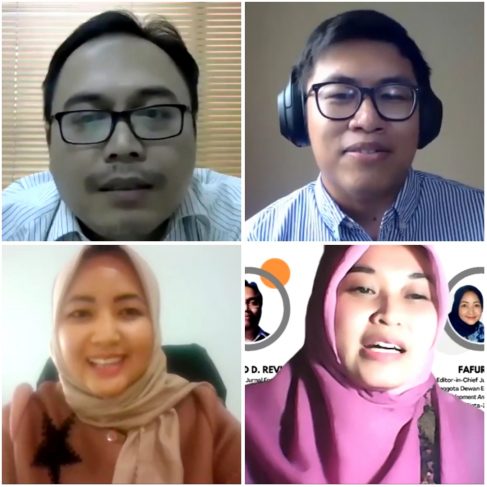LPEM FEB UI Holds “Meet the Editor” Webinar to Offer Practical Writing Tips for Economics Research Papers for Accredited National Journals
Nino Eka Putra ~ FEB UI Public Relations Officer
DEPOK – (2/9/2020) The Economic and Community Research Institute, Faculty of Economics and Business, Universitas Indonesia (LPEM FEB UI), on Wednesday (2/9/2020) held a webinar titled “Meet the Editor” to offer practical writing tips for economics research papers for accredited national journals. The webinar, jointly organized with Universitas Muhammadiyah Yogyakarta (UMY) and Universitas Negeri Semarang (UNNES), presented editors from English journals to share writing tips.
Speakers at the webinar were Mohamad D. Revindo, Ph.D., Editor-in-Chief of the Journal of Economics and Finance in Indonesia (LPEM FEB UI – Sinta 2 RistekBRIN) and member of the Editorial Board of the Indonesian Economic Journal (ISEI); Dyah Titis K. Wardani, S.E., MIDEC, Editor-in-Chief of the Jurnal Ekonomi dan Studi Pembangunan (UMY, Sinta-2 RistekBRIN); Fafurida, S.E., M.Sc., Editor-in Chief of the Journal of Economics and Policy (Jurnal Ekonomi dan Kebijakan, JEJAK and member of the Editorial Board of the of Economics Development Analysis Journal (UNNES, Sinta-2 RistekBRIN). The webinar was moderated by Jahen F. Rezki, Ph.D., Associate Editor of the Journal of Economics and Finance in Indonesia (EFI)/ LPEM FEB UI researcher.
Mohamad D. Revindo, the first speaker, said that the journal Economics and Finance in Indonesia (EFI) covers economic and financial issues from theoretical, empirical and analytical points of view at industry, regional and national levels. EFI gives economic coverage that focuses on population, employment, demography, natural resources, agriculture, energy, monetary, finance, capital market, crisis, industry, investment, regions, urban issues, maritime, rural issues and public policy, institutions, politics, development, health, education, poverty, international issues, international trade, international finance, methodology and historical thinking.

Here’s why writers should send their manuscripts for publication in EFI: EFI is an accredited journal, is internationally indexed, has a clear timeline for manuscript processing, maintains a balance between theory and practical implications, is open to multidisciplinary approach, and is published by Universitas Indonesia. Writers send manuscripts to be published in the journal to earn credits for promotion, give input to research, and disseminate information and knowledge. Scientific writing and journal management are developing rapidly (consisting of writers, reviewers and editors).
Following are EFI’s essay structure and reseach components: introduction (background, problem identification, objective and essay organization), literature review, method (analysis and source of data, result (research findings, interpretation, correlation with previous findings), and conclusion (implications of findings for policymakers and the business world when relevant, as well as the academic world, recommendations for future studies). “Tips for writers to have their manuscripts published in EFI: manuscript preparation (technical editor/peer reading, proofreading, plagiarism check), submission (journal research, compliance with writer’s guidelines, citation of papers from journals, application letter will be helpful),” said Revindo.
Dyah Titis K. Wardani, the second speaker, explained Jurnal Ekonomi dan Studi Pembangunan’s call for paper policy. The journal invites researchers to send manuscripts on monetary economics and banking, trade and international finance, community-based economics, natural resources, and environmental economics for the next issue. Writers can also send manuscripts about Islamic economy, (economic?) behavior, industry, development, regional economy and health.

“JESP sets a clear timeline. For example, call for paper for Volume 21 (2) October 2020 was issued in April-May 2020, followed by an extension of the deadline for submission to attract more manuscripts, review of manuscripts submitted through call for paper, announcement of manuscripts selected for publication, revision by writers when necessary (such as to correct typos, check plagiarism issue, and other errors), the layout of selected manuscripts, and upload of selected manuscripts to the open journal systems (OJS),” said Titis.

Fafurida, the third speaker, talked about the constraints faced by UNNES writers to have their manuscripts published in JEJAK. Among the issues are manuscripts that are not based on research results, failure to follow guidelines and template, manuscripts submitted still in the form of research reports, lack of understanding of the OJS process, submission of manuscripts to different journals, self-check of plagiarism without removing traces of archive recordings, and failure to monitor progress on OJS.
“Our strategy is to ensure that research-based manuscripts bring novelty, have clear focus and scopus based on objective, follow the guidelines, are not plagiarized works, are well written, and use required formats for quotations and references (writers are recommended to use the mendeley, endnote, zetero apps, among other apps),” Fafurida said, bringing the session to a close. (hjtp)
(lem)






